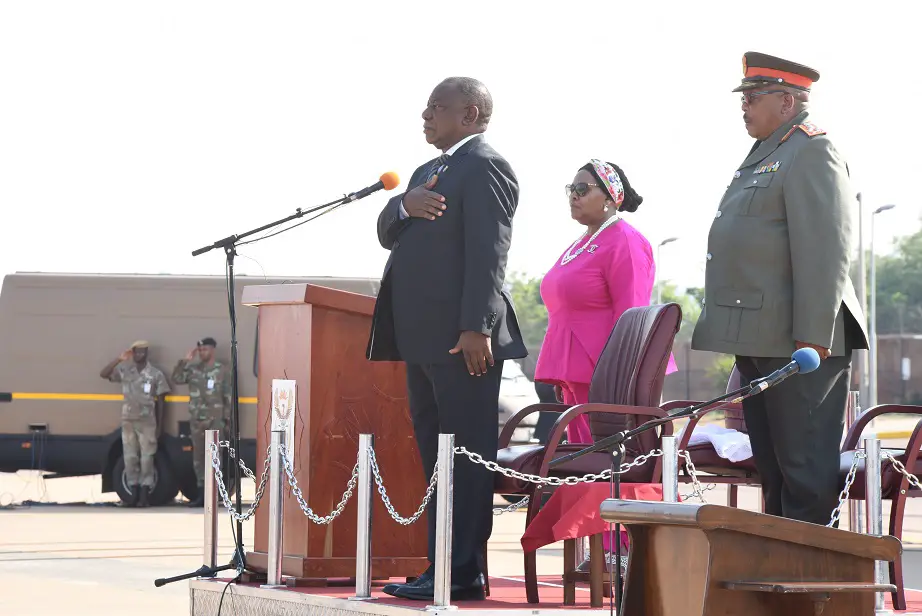Breaking news
President's Cyril Ramaphosa promotes development at the AAD 2018.
President’s Cyril Ramaphosa promotes development at the AAD 2018 Expo Official Opening. “South Africa views the role of the military in the modern context as a developmental force, both nationally and continentally”, this is the view from President Cyril Ramaphosa in his opening address of the 10th Africa Aerospace and Defence exhibition, taking place from 19 to 23 September at the Waterkloof air force base in Pretoria.

President's Cyril Ramaphosa at the AAD 2018 (Picture source : Khanya Comms )
According to the President, the show brings defence agencies and defence industries together in reflections on the evolution of security – and how they must each adapt to the requirements of the future.
“Improved security attracts investment, encourages growth and promotes development. In support of continental economic development, the SANDF forms part of the continental military intervention capability, in the form of regional intervention forces, as well as the centralised capability under direct control of the African Union. He argued that the South African National Defence Force ought to involve itself, with African partners, in peace missions to improve security in strife-torn regions. These intervention capabilities can reduce the risk of major interstate conflict and civil war.”
“From a national perspective, the development role of our defence force implies involvement in border safeguarding, adding that South Africa’s border safeguarding operation, Corona, also focuses on preventing the illegal exploitation of national resources.”
As far as internal security is concerned, the defence force must always be ready to provide additional capacity to maintain order and stability within the relevant governance framework.
“A defence force that is a developmental unlocks substantial peace dividends for states and effectively reduces the investment required in defence over time.”
Whilst the government continues to prioritise socio-economic objectives that provide the best possible future for the youth, he was adamant that the economy is under pressure pointedly saying the means available in the fiscus are finite.
The President acknowledged that the South African National Defence Force was adapting to this economic reality.
In this regard, the SANDF was prioritising within the implementation of the Defence Review by focusing on the core roles of the defence force. He said several ideas were being explored to modernise the funding model of defence and reduce its dependency on the fiscus. Still, for both security and developmental reasons, South Africa was looking after its defence industry.
“It is a national asset that has value for many departments and agencies of government,” he said. “It innovates products for the greater economy, such as systems that improve the safety of railway lines or improve the efficiency of shark nets. The common TV decoder in widespread use in South Africa is based on the intellectual property from a military technology project.”
The President noted the industry’s role as an important employer and an incubator of scarce skills in science, technology, engineering and mathematics.
“Some of our aircraft-related businesses are expanding in a highly competitive environment as suppliers to the biggest players in the global aircraft industry.” The industry is a steady earner of foreign exchange by delivering to the world leading products such as the Husky vehicle for detecting explosives and improvised explosive devices.”
In support of the industry, he outlined the many initiatives to maximise the value of the defence industry, notably the Defence Industry Strategy developed by the National Defence Industry Council, a Defence Sector Charter developed to open space for private participation by small and medium black enterprises and a defence industry fund that was launched in June this year as a funding mechanism for industry.
Government intends to support the industry to become export-driven on the back of international investment, by having a policy stance favouring international joint ventures with local industry. He noted defence industry investment destination, South Africa combines many unique factors.
Local industry still tends to own the full supply chain necessary for conceptualising and manufacturing their end product. Unlike many international ventures, defence production in South Africa does not imply multinational interdependency.
In terms of intellectual property, South Africa is one of less than ten countries that can manufacture missiles of a certain level of sophistication. He used this as an example, saying the development of intellectual property into technology demonstrators is very cost-effective due to the exchange rate between the rand and the major international currencies.
“Many nations, from different parts of the world, have recently expressed interest in becoming involved in joint ventures with our industry. The African Aerospace and Defence exhibition offers a massive opportunity for all present to identify areas of synergy and convert them into joint ventures.”
The President concluded by saying that South Africa is interested in leveraging intellectual property into tangible products and export contracts. “We assume that the interest of our visitors here is a good return on investment and we are confident that it can be achieved.”


























